
Andersonia is a genus of mostly small, evergreen shrubs in the family Ericaceae and is endemic to the Southwest Botanical Province in Western Australia.
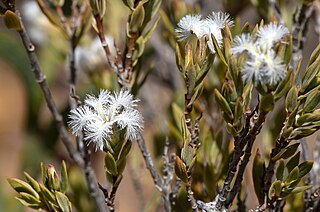
Leucopogon foliosus is a species of flowering plant in the heath family Ericaceae and is endemic to the south-west of Western Australia. It is a low, spreading shrub with hairy young branchlets, spirally arranged, erect, linear, narrowly egg-shaped to narrowly elliptic leaves, and white, narrowly bell-shaped flowers.

Leucopogon alternifolius is a species of flowering plant in the heath family Ericaceae and is endemic to south of Western Australia. It is a low, sprawling shrub with thin branchlets, egg-shaped leaves with a heart-shaped, stem-clasping base, and white or pale pink flowers arranged in up to twenty groups along the flowering branchlets.
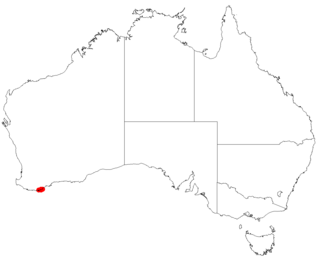
Leucopogon altissimus is a species of flowering plant in the heath family Ericaceae and is endemic to a restricted area in the south of Western Australia. It is a tall, erect shrub with glabrous branchlets, elliptic leaves and white or creamy-white flowers in groups in upper leaf axils or on the ends of branches.

Leucopogon audax is a species of flowering plant in the heath family Ericaceae and is endemic to a restricted area of the south-west of Western Australia. It is an erect, open, single-stemmed shrub with hairy branchlets, egg-shaped leaves and white flowers sometimes tinged with pink, in groups in upper leaf axils or on the ends of branches.
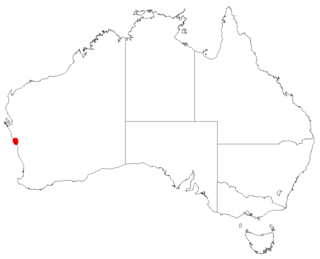
Leucopogon borealis is a species of flowering plant in the heath family Ericaceae and is endemic to a restricted area of the west of Western Australia. It is an erect shrub with hairy young branchlets, linear leaves and white flowers in nine to twenty upper leaf axils.
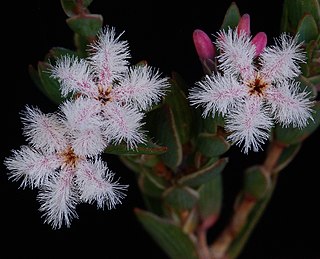
Leucopogon elegans is a species of flowering plant in the heath family Ericaceae and is endemic to the south-west of Western Australia. It is a spreading shrub with egg-shaped leaves, and white or pink, tube-shaped flowers densely bearded on the inside.
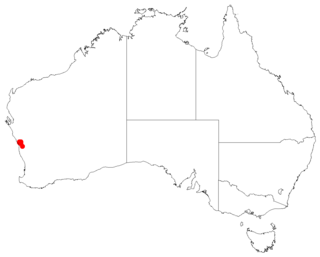
Leucopogon grammatus is a species of flowering plant in the heath family Ericaceae and is endemic to the south-west of Western Australia. It is an erect shrub with hairy young branchlets, spirally arranged, erect, egg-shaped leaves, and white, bell-shaped to broadly bell-shaped flowers.

Leucopogon inflexus is a species of flowering plant in the heath family Ericaceae and is endemic to the south-west of Western Australia. It is an erect, open shrub with more or less glabrous young branchlets, spirally arranged, erect, egg-shaped to more or less round leaves, and white, bell-shaped, densely bearded flowers.
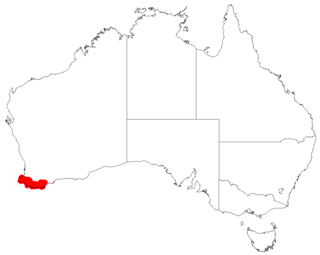
Leucopogon interstans is a species of flowering plant in the heath family Ericaceae and is endemic to the south-west of Western Australia. It is an erect shrub with brownish hairs on its young branchlets, erect, narrowly elliptic or narrowly egg-shaped leaves and white or pinkish flowers in groups in upper leaf axils or on the ends of branches.
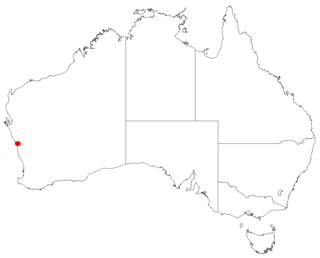
Leucopogon navicularis is a species of flowering plant in the heath family Ericaceae and is endemic to the southwest of Western Australia. It is an erect, compact shrub with hairy young branchlets, narrowly elliptic to narrowly egg-shaped leaves and erect, compact clusters of 4 to 12 white, bell-shaped flowers in upper leaf axils or on the ends of branches.
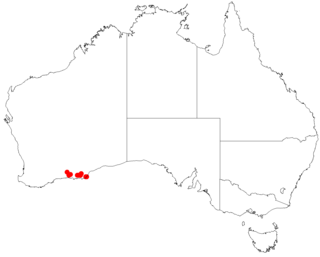
Leucopogon remotus is a species of flowering plant in the heath family Ericaceae and is endemic to the south-west of Western Australia. It is an erect shrub with a single stem at ground level, narrowly egg-shaped to egg-shaped leaves and erect clusters of 4 to 11 white, tube-shaped flowers usually on the ends of branches.

Leucopogon subsejunctus is a species of flowering plant in the heath family Ericaceae and is endemic to a restricted area in the south-west of Western Australia. It is an erect shrub with hairy young branchlets, spirally arranged, narrowly egg-shaped or narrowly elliptic leaves, and white, bell-shaped flowers with a pink tinge.
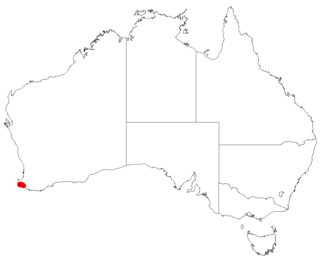
Leucopogon wheelerae is a species of flowering plant in the heath family Ericaceae and is endemic to the far south-west of Western Australia. It is a sprawling shrub with slender, glabrous young branchlets, more or less erect, egg-shaped or broadly egg-shaped leaves, and white, broadly bell-shaped flowers with white or pale pink lobes.
Styphelia cernua is a species of flowering plant in the heath family Ericaceae and is endemic to a small area of Western Australia. It is an erect shrub with narrowly egg-shaped leaves with the narrower end towards the base, and white flowers arranged singly or in pairs in leaf axils.
Brachyloma djerral is a species of flowering plant in the family Ericaceae and is endemic to a small area in the west of Western Australia. It is an erect, compact shrub with narrowly egg-shaped to narrowly elliptic leaves and red, tube-shaped flowers.
Styphelia filamentosa is a species of flowering plant in the heath family Ericaceae and is endemic to a small area in the south-west of Western Australia. It is a low, compact, spreading shrub with egg-shaped to narrowly elliptic leaves, and white, tube-shaped flowers arranged singly, or in groups of up to four in leaf axils.
Styphelia filifolia is a species of flowering plant in the heath family Ericaceae and is endemic to the south-west of Western Australia. It is an erect shrub with erect, linear leaves, and white, tube-shaped flowers arranged singly, or in groups of up to four in leaf axils.
Styphelia longissima is a species of flowering plant in the heath family Ericaceae and is endemic to a few places in the south-west of Western Australia. It is an erect shrub with hairy young branchlets, stem-clasping, sharply-pointed, narrowly egg-shaped to narrowly elliptic leaves, and white, tube-shaped flowers.
Styphelia sulcata is a species of flowering plant in the heath family Ericaceae and is endemic to a small area in the south of Western Australia. It is a low, compact shrub with narrowly egg-shaped leaves and white flowers arranged singly in leaf axils.














